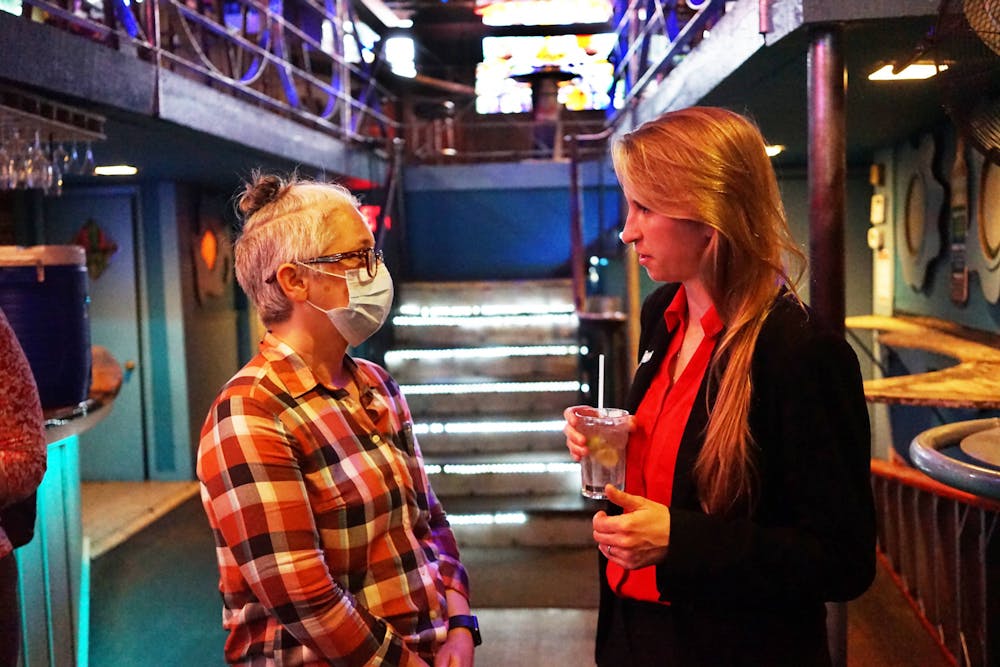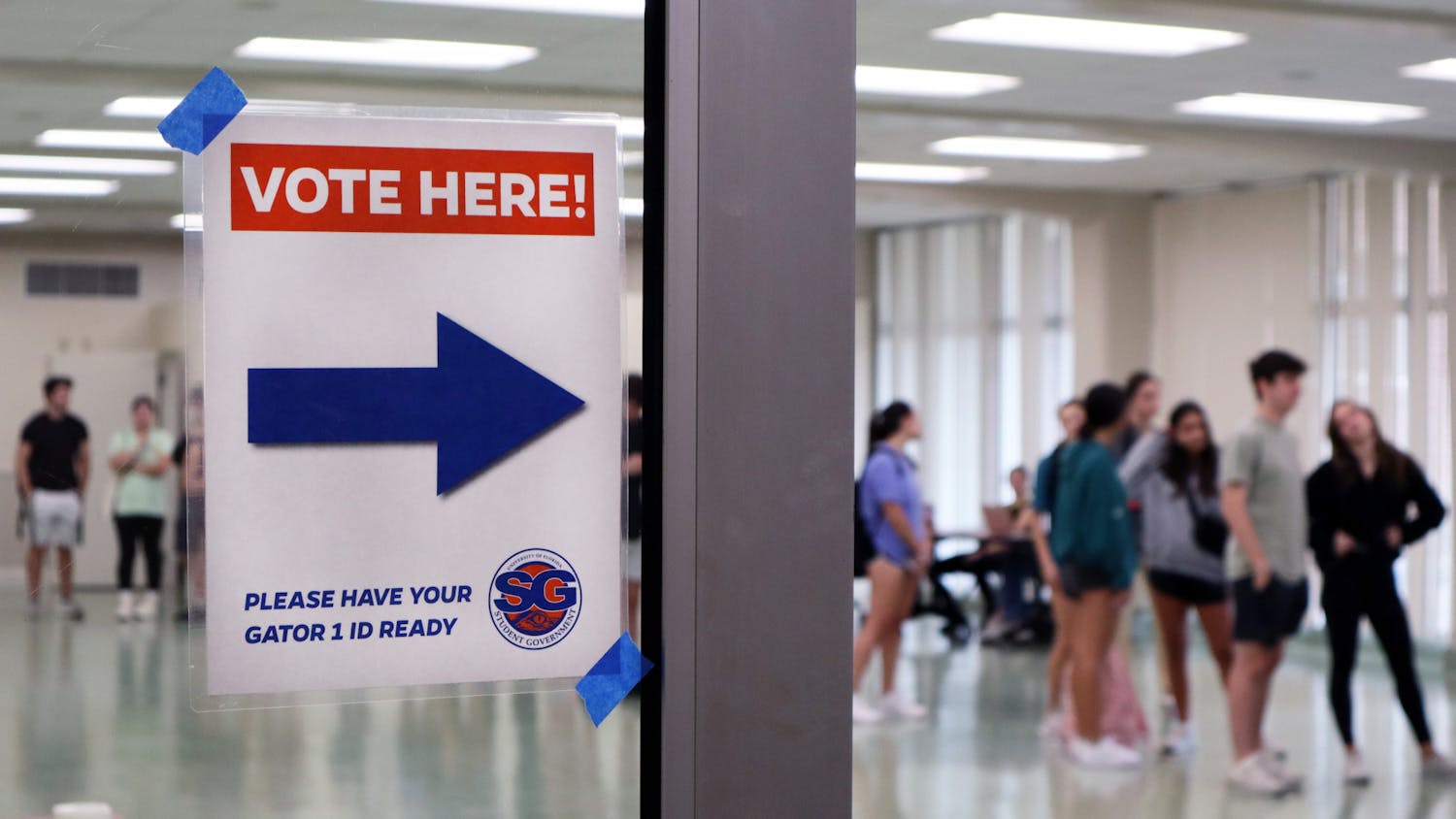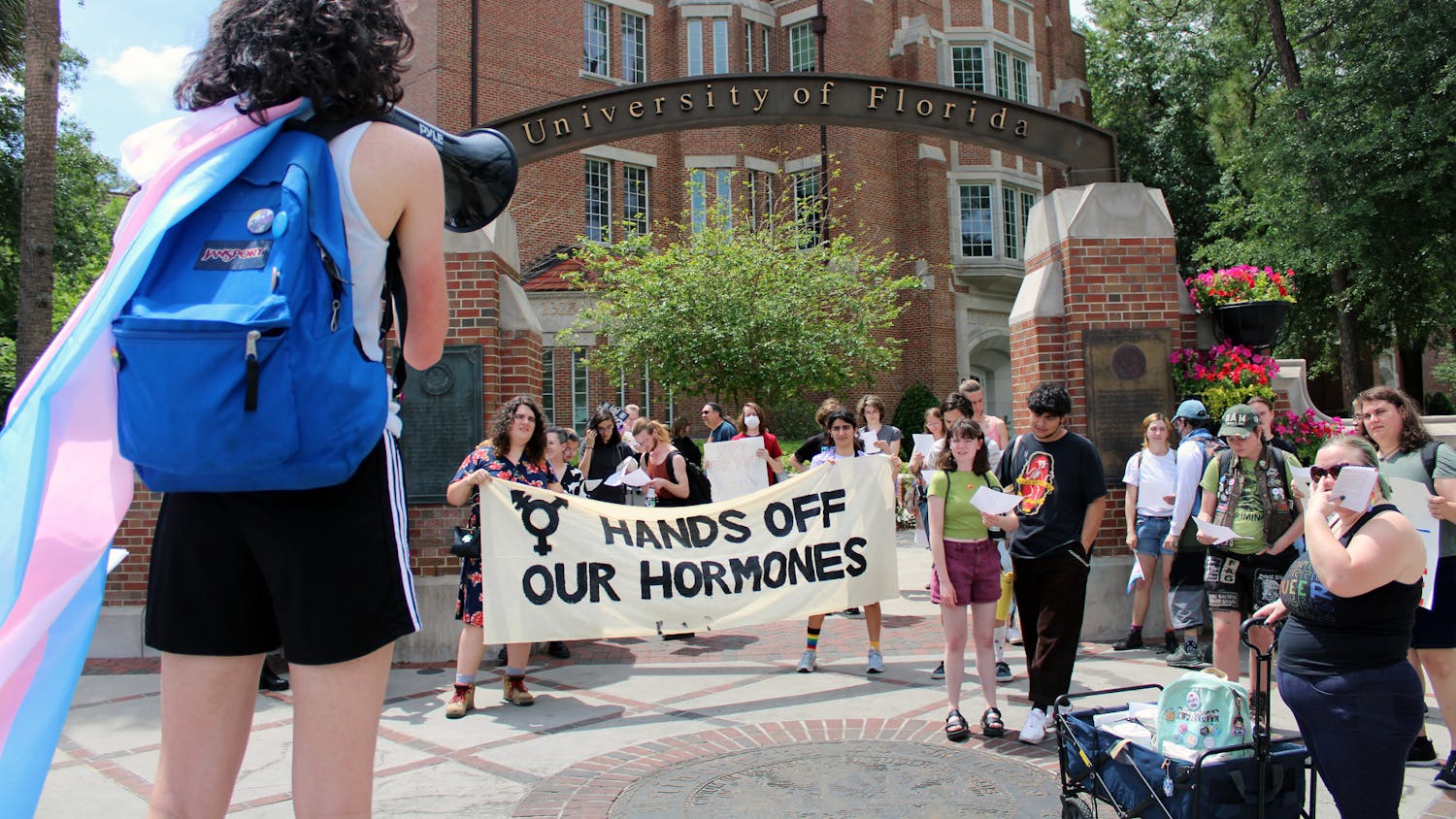Under the cloud of recent Florida legislation targeting LGBTQ rights, a panel of legal experts, medical professionals and activists discussed discrimination from the state during a Pride Month town hall meeting.
Nearly 200 residents crowded the local gay nightclub, University Club, to hear the panelists share legal advice and ask questions June 1.
The panel highlighted laws restricting discussions of LGBTQ themes in K-12 classrooms, transgender healthcare, transgender individuals’ ability to use the restroom aligning with their gender identity, minors’ attendance at drag performances and the defunding of diversity, equity and inclusion initiatives.
Donn Smith-Lopez, the 52-year-old vice president of the Pride Community Center of North Central Florida, and CJ Acevedo, a WellFlorida Council Inc. HIV prevention program coordinator, organized the town hall to provide a space for members of the LGBTQ community and allies to combat misinformation surrounding the implications of the laws.
“A supermajority and a governor bent on creating a platform so he could run for president cooked up all of these bills and laws in order to oppress and discriminate against folks that typically have not had a strong voice in our legislative process,” Smith-Lopez said.
Throughout the event, panelists emphasized the legislation as an attempt to erase the progress of the LGBTQ community over recent decades.
They also stressed the bills’ language and said it is purposefully vague to encourage self-censorship among impacted individuals and institutions.
Panelist Simone Chriss, an attorney and director of Southern Legal Counsel’s Transgender Rights Initiative, is working behind the scenes to challenge the legislation.
“We have the law and facts on our side,” she said. “The other side has misinformation and fear.”
To begin the panel presentation, Chriss broke down the effects of House Bill 1069, the expansion of the 2022 “Don’t Say Gay” bill, to K-12 classrooms. The law broadens the existing ban on classroom instruction on gender identity and sexual orientation from K-8 classrooms to up to 12th grade.
Schools also cannot force a teacher, student or staff member to respect the desired pronouns of another person, according to the law. However, Chriss emphasized that while the law allows schools to disregard desired pronouns, it is not mandated.
“Your child should still have their affirmed name and pronouns used consistently,” she said.
Additionally, Chriss cleared misconceptions about Senate Bill 254, which bans Florida medical providers from prescribing minors gender-affirming care, restricts access to gender-affirming care for adults and limits parental rights for medical decisions involving children.
The law’s custody provision, which allows Florida to take emergency jurisdiction of a child, only applies to out-of-state custody orders concerning a divorce, Chriss said.
“The state cannot investigate or take children away from parents for supporting their trans children,” she said.
Chriss suggested transgender youth and adults who are having trouble accessing gender-affirming care from state providers contact out-of-state providers.
Panelist Gina Duncan, a regional development leader for Equality Florida, also spoke about the controversial legislation.
Duncan explained House Bill 1521, which criminalizes individuals for using restrooms “designated for the opposite sex” inside educational institutions, correctional facilities and government buildings and refusing to exit upon request from certain-level employees.
Penalties for violating the law can be as severe as a misdemeanor charge, Duncan said.
Duncan advised those affected to use a unisex or family-designated bathroom or bring someone with them to the restroom due to the law’s vague language and the unknown enforcement tactics for determining one’s sex assigned at birth.
Duncan also discussed Senate Bill 1438, which targets drag performers. The law punishes businesses that let minors into adult live performances, which are broadly defined. If found in violation, businesses could face fines and have their liquor license revoked.
Under SB 1438, local governments may not give permits to events featuring adult live performances where a minor will be present. This provision of the law could impact Gainesville’s ability to hold Pride-themed celebrations, Duncan added.
“The goal here is erasure — to move us back to where we were 20 years ago,” she said.
Chriss returned to the floor to explain Senate Bill 1580, which allows medical providers to refuse to supply healthcare coverage or services based on religious, moral or ethical beliefs.
However, any objection must be directed towards a particular service, not the patient or overall care, Chriss said.
Additionally, healthcare providers must give written notice of their objection to their employer and inform the patient of their refusal to provide a service before they schedule an appointment. The law still requires providers to administer emergency treatment despite objections.
Before she ended the panel’s presentation, Chriss also touched on Senate Bill 266. The bill restricts politically disfavored topics, like systematic racism within the curriculum of state universities and colleges and bars the use of state funding for DEI initiatives and programs.
“Many of [SB 266 provisions] will be quickly enjoined and overturned,” she said. “They’re so facially, blatantly, unapologetically unconstitutional.”
Local elected officials spoke about their dedication to protecting the rights of Gainesville’s LGBTQ community despite the controversial laws at the conclusion of the presentation.
The Gainesville City Commission is committed to hosting Gainesville’s annual Pride celebration in October at Bo Diddley Plaza with drag performers and the ability to use whichever bathroom aligns with one’s gender identity, said Gainesville City Commissioner Casey Willits.
“The general consensus on the city commission is that we're not going to back down,” he said.
Many attendees left the town hall with less confusion and more hope than they walked in with.
Manda Wittebort, a 32-year-old program coordinator at the UF David and Wanda Brown Center for Leadership and Service, attended the event so they could be more informed about the laws and help dispel misinformation.
“Our silence takes a position,” they said. “They win if we give into fear.”
Bills like SB 266 impact their livelihood as their work centers on helping students find their sense of belonging. Widespread education about diverse perspectives and identities is crucial for LGBTQ students to feel affirmed, they said.
"Our diversities don’t push us apart, they bring us together,” they said.
Contact Amanda at afriedman@alligator.org. Follow her on Twitter @amandasfriedman.
Amanda Friedman is a senior journalism major and the Enterprise Editor at The Alligator. She previously wrote for the Avenue, Metro and University desks. When she isn't reporting, she loves watching coming-of-age films and listening to Ariana Grande.






